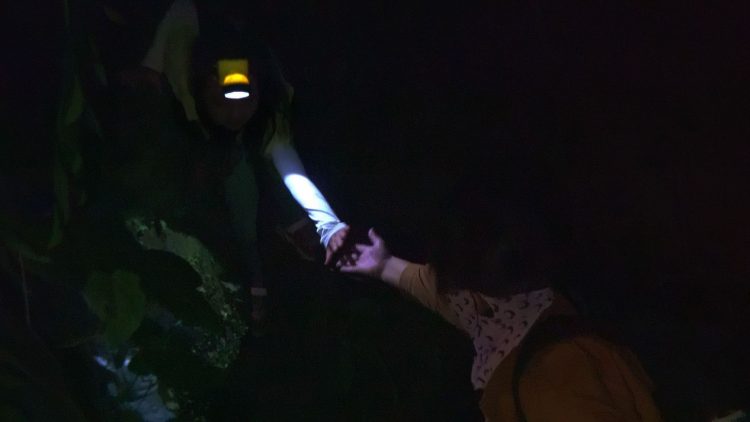 The prize-winning documentary features at this year’s Sundance Film Festival suggested an audience, and jury, that were drawn to experimentations in the documentary form on film that sought out a variety of different approaches to what the documentary could be.
The prize-winning documentary features at this year’s Sundance Film Festival suggested an audience, and jury, that were drawn to experimentations in the documentary form on film that sought out a variety of different approaches to what the documentary could be.
The suspenseful “Beyond Utopia”, which played in the US Documentary Competition, an account of various individuals attempting to flee North Korea, is more immersed in the notion of the documentary as a vessel for journalistic investigation, drawing viewers in the context of what is like to live in – and leave – the oppressive regime.
“Against the Tide”, an entry in the World Cinema Documentary Competition, examines how two close friends (both fishermen) find themselves on divergent paths as to their professional lives, using an artistic lens that feels deliberately elliptical.

(Image courtesy of the Sundance Film Institute)
The third entry, also playing in the US Competition, is an empathetic viewpoint into the imagination of radical poet Nikki Giovanni and her musings on life, blackness, womanhood, and space travel in the “Going to Mars: The Nikki Giovanni Project”.
Beyond their documentary forms, each of these works feel unrelated to the others, sometimes successfully drawing on the form and sometimes less so but the trio do offer a view towards the possibilities of documentary features that are likely to be discussed over the course of 2023.
“Beyond Utopia”
Madeleine Gavin’s film was the winner of US Documentary Audience Award, and it was an unsurprising win especially considering the political and emotional weight of the work and the general idea of what documentaries do for most audiences. For many, documentaries are an entry-point into learning about the world. The geopolitical intentions of “Beyond Utopia” fall neatly within this framework. There are three explicit arcs here – the first is the most urgent, as we see stay close to the anxieties and point-of-views of defectors from North Korea. Through talking heads, hidden-camera footage and some clever imagery we listen to various North Koreans speak of their experiences, and the experiences of loved ones, attempting to flee. This personal dynamic is bolstered by a second arc – zeroing in on Seoul-based Pastor Seungeun Kim who has spent decades assisting defectors with a network of brokers in Laos, Thailand, Vietnam, China and North Korea. The documentary opens up by paralleling Kim’s work as an assistor with his own traumatic history of escape. The third sliver of the film seeks to contextualise the closed-off North Korean regime putting it into real-world context with the drive of a news-reel.
The three parts of “Beyond Utopia” make for an informative and gripping text, even as there are moments the confluence makes for some moments of mixed messaging. It’s easy to see why audiences were gripped by the strong urgency of the political turmoil of North Korea. The “utopia” of the title is the view of the country citizens are fed through propaganda and the film peels back the layers to reveal a dystopia where the sceptre of a utopia once loomed. In moments with writer and defector Hyeonseo Lee the dynamics of what it is like to live in (and leave) the country feel robust and thoughtful. Less thoughtful, though, is an American dynamic to the film’s own geopolitical vantage point. When the film steps back from the actual North Korean, presenting a very surface-level global political dynamic of how North Korea came to be and with the American contrast as one of capitalistic fortitude “Beyond Utopia” feels less engaging and less incisive. Of course, “Beyond Utopia” is not a film about introspectively examining how North Korea came to be an oppressive regime, but there’s a superficiality to the limited way talking-head experts and CIA analysts add little depth and contexts to the film in moments that feel more repetitious and less revealing.

Still, “Beyond Utopia” finds urgency and emotion in the way it intersperses hidden camera footage with archival footage and (some) thoughtful uses of talking heads. The harrowed utilitarian nature of the hidden camera footage makes the urgency even more pronounced. This feels like stolen footage that emphasises the stakes here and is a vital touch from Gavin in presenting the trauma that reverberates through the defectors. Even “Beyond Utopia” is less adept when its critique of North Korea seems enmeshed with an incurious contrast of capitalism in America as heroic, finding the specificity of the survivors elided with a broad stroke “communism is evil” recurring thread the beating heart centre of the largest stakes here leave the film as a stirring one. A single scene of a defector unlearning the brainwashing after leaving the would-be utopia offers more than any detached talking head.
“Against the Tide”
Indian filmmaker Sarvnik Kaur won the World Cinema Documentary Special Jury Award for Vérité Filmmaking for his new documentary “Against the Tide”, one of the most formally impressive entries at Sundance this year. Even as I left “Against the Tide” with mixed thoughts, it’s hard to indict Kaur for an incredibly specific and ambitious visual approach to his film. Like with “Beyond Utopia”, there is an important element of information-sharing that makes “Against the Tide” feel vital. We find ourselves immersed in the Indigenous Koli community in Bombay where we meet two fishermen Rakesh and Ganesh. The two men, friends who see themselves as brothers, have taken divergent roads in their profession. Rakesh is a traditionalist. With his father’s boat and the knowledge of his forefathers he fishes in the traditional way. He has never left India, unlike Ganesh who was educated abroad and has embraced a modern, technology-
driven and environmentally murky approach to fishing. It starts off as two pathways, but by the middle “Against the Tide” becomes a tale of fractured ideals and the two men find themselves experiencing personal and professional frictions.
This is an ambitious and engaging concept, and the focus on documentaries beyond the western concept of what kinds of stories deserve privilege makes “Against the Tide” a valuable film just on the level of risk and originality. And yet, in practice, the actual film feels less thoughtful than intentions. “Against the Tide” looks pristine with some gorgeous tableaus and equally compelling sound design in some sequences but I increasingly found its approach to documentary work overdetermined and effortful in a way that ends up making this a more frustrating than illuminating experience. It is a fool’s errand to think of documentary filmmaking through the lens of authenticity. Any work, written or filmic, that engages in communicating information is trapped within the lens of its teller. There is a narrative that comes even with truth, but there is an almost aggressive note of superficiality that runs through the too-tidy tableaus of “Against the Tide”, so very gorgeous but exacerbating a mechanical construct that begins to contrast with the ethos of the characters themselves.
It is less a question of veracity, and more a question of construction. The artificiality that leaps out of “Against the Tide” is emphasised by editing choices which leave the language, the conflict and the dynamics towards the last third of the film more attuned to eliciting a specific emotional response from the audience, rather than thrusting us into a world to observe and draw our own understanding. The LED fishing that is so central to the fracture in the relationship of the two men often feels like an afterthought, and although Kaur attempts to hold the two individual narratives as parallel ones oftentimes it feels as if we are encountering two separate stories rather than a single wholistic one. There are many obvious comparisons to “All That Breathes” another Indian documentary on environmental issues that was a prize-winner at the 2022 Sundance Film Festival. In that film, Shaunak Sen considered the lives of two brothers who rescue injured birds. The comparisons are not hard to discern. Both recognise the plight of working-class Indian men working in tandem with the natural world as the larger society ignores them, but it is not a comparison that serves “Against the Tide” very well. I’m interested to see what Kaur does next in his career, he’s a clearly skilled aesthetician with a sharp awareness of the camera but “Against the Tide” too often feels more glossily superficial than truly exacting or analytical. A strange case for something that seems to be so interested in a naturalistic approach.
“Going to Mars: The Nikki Giovanni Story”
How lucky, then, that the thrilling documentary on writer Nikki Giovanni feels so present, and tender, and distinct and perceptive. Co-directors Joe Brewster and Michèle Stephenson won the US Documentary Grand Jury Prize for the film, a welcome announcement for an incredibly thoughtful work and one of the best films that played at the festival this year.
“Going to Mars” is not the documentary many will expect when they seek out a film about a legendary figure. This is not a biography. Neither is it a hagiography. Instead, this is a lithe and intelligent and warm and thoughtful film that offers us a chance to sit with Giovanni in all her paradoxes for just under two hours. For the filmmakers, this is not a newsreel nor is it a classroom lesson. “Going to Mars” is an expression of love reverberating from Giovanni to herself, to her community (especially Black women) and back to this woman who has lived her life with strength and temerity. Rather than a finitely chronological account, “Going to Mars” takes us backwards and forwards. Its title is both a nod to Giovanni’s own writing and her slyly pointed remark that “The trip to Mars can only be understood through Black Americans.”
The context for the title is a wondrous bit of understanding of how Giovanni thinks. Black enslaved women, Giovanni tells us, were brought to plantations where they encountered enslavers that were like aliens. And those same Black women learned to manoeuvre in this alien world – learning new language, enduring the brutality and indignity of rape and other violent atrocities and yet they persisted in creating a home for themselves. If those Black women could conquer that alien world, then surely, they can conquer Mars? It’s a provocative argument and one that “Going to Mars” examines with gentle care. We watch footage of a younger Nikki Giovanni in various interviews, and then moments with an older Giovanni in her day-to-day life. The contrast is stunning. Here before us, we find a pillar of Black art and lyricism who sees the world through an individual vantage point but one that is humorous and warm and sharp. In a late scene, in a creative writing classroom, Giovanni explains what she thinks artists do. They don’t set out to teach their audiences, she contends. All artists really aim to do is to show us a part of themselves.
The moment feels like the thesis for the film – not an invective, not a screed but an invitation to sit and take a moment with this woman.
So the actual filmmaking in “Going to Mars” feels both sharp and elliptical. In an early scene, we see Giovanni and her adult son as the narrator tells us they are now rebuilding a relationship after being estranged for some years. Another film might have dug into that estrangement which might present potential avenues of dramatic worth except, “Going to Mars” is focussed on its thesis in ways that it observes but does not dig into every crevice of her life. The choice is startling at first but builds itself into a film that is assured of its focus. “Going to Mars” is an invitation into the perspective of a woman who has lived singularly, and so it is a film which thinks singularly. The motifs of journeying, finding, seeking, reaching define the way the narrative finds itself hurtling through timelines and yet the film never feels confusing or incoherent. Instead, it emerges like a wondrous eruption of a mind carrying each idea to its natural end.
This documentary is not a lesson. It is, instead, an earnest expression of love. Distinct. Imperfect. Elusive. Fragile. Tender. Sad. Elliptical. Fractured. Steady. Perceptive. Lyrical. Each recitation of a poem from Giovanni feels like a welcome balm.
Light the candles. This is a rocket. Let’s ride.






